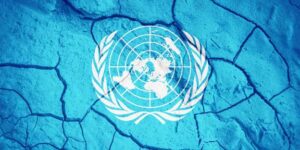
Civil Society, Climate Action, Climate Change, Editors’ Choice, Environment, Featured, Headlines, Middle East & North Africa, Sustainable Development Goals, TerraViva United Nations

UN agencies are working together to integrate traditional knowledge with modern technology, optimizing water use for agriculture. Credit: FAO Iraq
– Climate change and water scarcity pose significant threats to Iraq’s stability, prosperity, and the well-being of its people. The environmental challenges facing the nation are complex and interconnected, requiring a comprehensive and coordinated response.
In Iraq, the United Nations Country Team (UNCT), under my leadership, has been at the forefront of addressing these critical issues, working tirelessly to build a more sustainable and resilient future for all Iraqis.
Through the Resident Coordinator’s Office (RCO), we aim to leverage the diverse expertise and resources of different UN agencies, fostering a coordinated and integrated approach to development challenges.
Through this collaborative model, we can maximize our impact and deliver holistic solutions to tackle the interconnected web of factors that contribute to climate change and water scarcity.
This includes not only mitigating the immediate effects of these environmental threats but also addressing their underlying causes, such as unsustainable water management practices and overreliance on fossil fuels.

United Nations Resident Coordinator in Iraq Ghulam Isaczai visiting a water project site. Credit: UN in Iraq
The UN in Iraq has made a lasting impact in Iraq through a number of key initiatives. These include:
1) Forging climate resilience
Iraq is highly vulnerable to climate change impacts, including rising temperatures, droughts, and desertification severely impacting agricultural productivity and social stability. To address this, the UNCT, in cooperation with the Iraqi Government, organized Iraq’s first Climate Conference in Basra in 2023. This event resulted in the “Basra Declaration” with key government commitments and initiatives like an afforestation campaign, aimed at enhancing Iraq’s climate resilience.
These efforts led to increased national and international awareness and cooperation on climate issues, establishing a framework for future environmental and policy planning, including the National Adaptation Plan (NAP) and Nationally Determined Contributions (NDC).
The Basra Declaration aims at strengthening Iraq’s institutional, technical, and financial capacities to tackle climate change by mainstreaming medium- to long-term adaptation strategies into national and local planning.
2) Advancing water security
Iraq suffers from a critical water crisis due to reduced rainfall and over-utilization of the Tigris and Euphrates rivers. These challenges are exacerbated by inefficient water management and agricultural practices.
Last year, Iraq was the first country in the Middle East to join the UN Water Convention, underscoring the country’s commitment to boosting regional cooperation and ensuring equitable water use, essential for the stability and prosperity of the region.
In alignment with these national objectives, the RCO is leading a ‘Water Task Force’ that brings together UN agencies in Iraq to enhance water governance, boost agricultural resilience, and improve sustainable water usage.
For instance, the UN Educational, Scientific and Cultural Organization (UNESCO) and the Food and Agriculture Organization (FAO) are working together to integrate traditional knowledge with modern technology, optimizing water use for agriculture—an essential step for bolstering Iraq’s food security.
Meanwhile in the Sinjar district, a United Nations Office for Project Services (UNOPS) initiative, funded by the Italian government is transforming local water access, in-line with the need to ensuring safe water for all Iraqis. Similarly, in Ninewa Governorate, the UN Children’s Fund (UNICEF) installed water desalination systems in seven villages, significantly improving living conditions.
3) Preserving the Mesopotamian Marshes
The Mesopotamian Marshes, a unique ecosystem and a UNESCO World Heritage Site, are threatened by climate change, pollution, and unsustainable water management practices, leading to severe ecological and human impacts.
The RCO coordinated efforts across UN agencies to conserve the marshes by developing environmental strategies, supporting afforestation projects and facilitating community-based adaptation plans to improve the livelihoods of local communities.
For example, the World Food Programme (WFP) is undertaking afforestation projects in both southern Iraq and the Kurdistan Region, aligning with the government objective of planting five million trees by 2029. These efforts are directly contributing to the national climate change strategy through the Local Adaptation Plan, focusing on areas most impacted by climate change.
Furthermore, the UN has led legislative advancements in natural resource management, including the adoption of the Environmental Strategy and the National Sustainable Land Management Strategy and Action Plan, which are crucial for agriculture and marshland conservation.
These initiatives have helped restore ecological balance, supported local livelihoods, and bolstered the marshlands’ resilience to environmental pressures, thereby securing their status as a UNESCO World Heritage Site.
4) Developing renewable energy policies
Iraq’s heavy reliance on fossil fuels not only constrains its economic stability but also contributes to substantial greenhouse gas emissions. The country has significant potential for renewable energy development but faces challenges in attracting investment and developing necessary infrastructure.
To address this gap, the UN facilitated the revision and adoption of Iraq’s Renewable Energy Law, a pivotal move towards boosting renewable energy investment and development. The revised Renewable Energy Law has created a more favourable environment for renewable energy investment.
Similarly, an initiative by the United Nations Development Programme (UNDP) is supporting Iraq’s shift away from oil-dependence, through the NAP – which outlines efforts to reduce emissions and prepare for the effects of climate change. The UN is also assisting Iraq develop its NDCs for 2025, which is the country’s commitment to reduce emissions and adapt to climate change as part of the Paris Agreement.
These efforts have opened avenues for increased investment in renewable energy, promoting sustainable economic growth and reducing the country’s carbon footprint.
A sustainable and resilient future for Iraq
The collective work of the UN in Iraq has set the country on a promising trajectory towards climate sustainability and resilience. Our upcoming United Nations Sustainable Development Cooperation Framework (UNSDCF) for 2025-2029 will outline our efforts to help Iraq mitigate and adapt to climate change, manage water resources sustainably, and protect its unique environmental and cultural heritage.
As we look to the future, the UN in Iraq remains committed to supporting the government and people of Iraq in their pursuit of a sustainable and resilient future.
Ghulam Isaczai is United Nations Resident Coordinator in Iraq. To learn more about the work of the UN in Iraq visit iraq.un.org.
IPS UN Bureau













